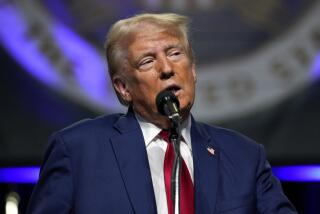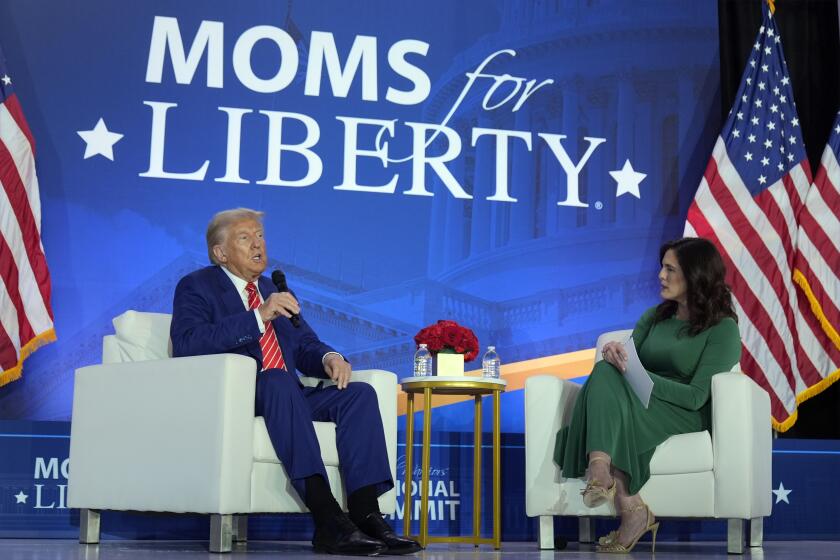Rockefeller’s Pullout Blurs Democrats’ Outlook for ’92 : Politics: His action feeds perception that there is no credible candidate. But some say it clears way for others.
With Sen. John D. (Jay) Rockefeller IV’s departure from the 1992 presidential picture, Democrats face a mixed vista of dashed hopes and potential opportunities as they struggle to find a candidate who can lead them back to the White House.
Rockefeller’s decision--coming at a time when President Bush’s poll standings are still at high levels--is bound to heighten the public impression that the Democrats are having difficulty mounting a credible challenge to the President’s reelection. This perception, party leaders fear, could turn into a self-fulfilling prophecy.
Although the West Virginia senator was untested in national politics, the prospect of his candidacy took on disproportionate significance for many Democrats who were desperately seeking a knight in shining armor to break their party’s string of three successive presidential defeats.
With his access to financial support, his legendary name and his problem-solving approach to government, Rockefeller was viewed as a potentially formidable standard-bearer. More than that, many regarded him as a unifying force who could rally the Democratic factions and stave off the sort of ideological blood baths that have divided and doomed Democrats in the past.
“He was somebody people were taking seriously, and he stressed issues like health care, which could pull people together,” said Joe Trippi, a Democratic political consultant and veteran of the John F. Kennedy, Walter F. Mondale and Gary Hart presidential campaigns. “If somebody with his credentials and resources takes a pass on this race, that sends a message to the other candidates.”
But some party leaders see more reason for optimism. They argue that Rockefeller’s absence creates more room for other candidates, such as Arkansas Gov. Bill Clinton, Tennessee Sen. Albert Gore Jr. and perhaps even New York Gov. Mario M. Cuomo. In addition, former Massachusetts Sen. Paul E. Tsongas already has declared his candidacy, and Iowa Sen. Tom Harkin is considered almost certain to follow suit.
“Rockefeller’s pulling out probably increases the possibility of Gore and Clinton coming in,” said Stan Greenberg, who conducts polls for both politicians. “This gives them more space to raise money and build support.”
Clinton advisers said that they expect the Arkansas governor to make clear his intention to run, perhaps as early as next week. Clinton’s entry in the race would set the stage for an intense ideological fight between the Arkansas governor, a leader of the Democratic Leadership Council, which is trying to move the party to the right, and Harkin, an unashamed liberal with a gift for fiery populist rhetoric.
Both men provided a mild preview of what the coming campaign could be like when they spoke separately in June at a Los Angeles rally of liberal activists. Harkin won cheers when he declared: “We need a President who understands (that) the real threat to our national security isn’t halfway around the world, it’s halfway down the street.”
By contrast, that same audience gave Clinton the silent treatment when he called for work requirements for welfare recipients and for greater responsibility from beneficiaries of social programs.
Once the campaign actually gets under way, differences are likely to get sharper and the rhetoric hotter. But Al From, executive director of the Democratic Leadership Council, said that such a rigorous debate would do the party more harm than good.
“The party has been going off the cliffs in presidential elections in the past,” said From. “The issue is whether we can change course.”
Although Clinton is reported to be on the verge of joining the race, Gore, a veteran of the 1988 campaign, is said to be pondering his political future while on vacation with his family in Tennessee.
Gore’s delay in deciding whether to run has caused some Democrats to suspect that he would prefer to sit out the 1992 contest and wait until 1996, when the prospects for regaining the White House presumably will be better.
Probably the most inscrutable and, some think, the most potent of the Democratic presidential possibilities is Cuomo, who disdains interest in seeking the presidency but seems eager to take a leading role in debating presidential kinds of issues.
Pollster Greenberg said that Rockefeller’s withdrawal will make Cuomo more inclined to run because he will be convinced that the party needs him. “The more the press writes that the sky is falling on the Democrats, the more likely Cuomo is to become a candidate,” Greenberg said.
A more likely possibility, many believe, is Virginia Gov. L. Douglas Wilder, the first black man ever elected a state chief executive. Despite the unfavorable publicity from his feud with a fellow Democrat, Virginia Sen. Charles S. Robb, Wilder has continued to talk and act like an outsider preparing to challenge the political Establishment in Washington.
Wilder’s backers got permission to take a poll testing his support in New Hampshire, the nation’s first presidential primary state, the governor disclosed this week.
And Wednesday, in an address to the National Lieutenant Governors’ Conference, Wilder condemned leaders of his own party and the GOP for last fall’s budget agreement, calling it “the most regressive package of tax increases and budget flimflam in recent history.”
While Wilder forges ahead, civil rights leader Jesse Jackson, a veteran of the 1984 and 1988 campaigns, remains in the background, at least for now. According to the Boston Globe, Jackson is considering being the host of a television talk show on CNN instead of running again in 1992. But even close associates concede that they do not know what he will do.
One other name once prominent in Democratic presidential speculation is that of Texas Sen. Lloyd Bentsen, the 1988 Democratic vice presidential candidate who has shown little sign of the interest in the presidency that he exhibited last fall when he traveled to Iowa to address a party fund-raising dinner.
Still, Democrats are reluctant to write Bentsen off completely. One possible scenario: If none of the stronger prospects enter the race, party leaders might try to prod Bentsen into running, if only to avoid horrendous losses in the 1992 congressional races.
Meanwhile, the list of possibilities increased last week when former California Gov. Edmund G. Brown Jr., who had made bids for the presidency in 1976 and 1980, indicated that he was thinking about trying again.
House Majority Leader Richard A. Gephardt of Missouri took himself out of consideration two weeks ago, saying that he preferred to serve his party in the House. And another prominent Democrat, New Jersey Sen. Bill Bradley, ruled out a presidential candidacy for himself when he began his Senate reelection campaign last year.
Given all the uncertainties, Democrats concede that, when the campaign begins next year, their actual field of candidates may lack stature and name recognition. But they contend that those assets will come with time and success. “At this point in 1979, who ever heard of George Bush?” From asked.
More to Read
Get the L.A. Times Politics newsletter
Deeply reported insights into legislation, politics and policy from Sacramento, Washington and beyond. In your inbox three times per week.
You may occasionally receive promotional content from the Los Angeles Times.






